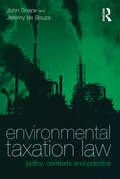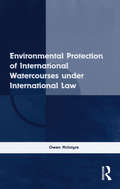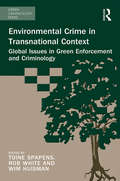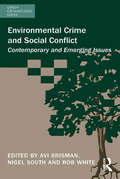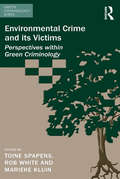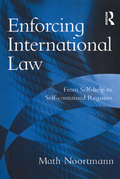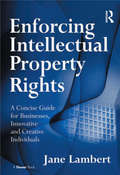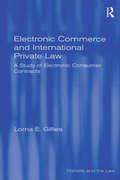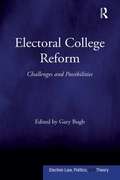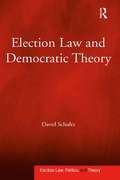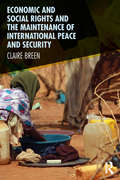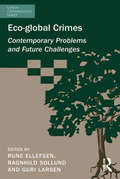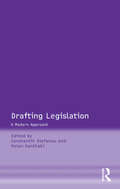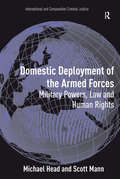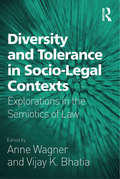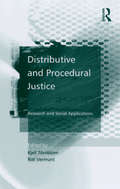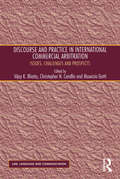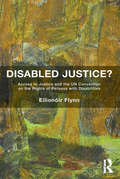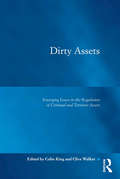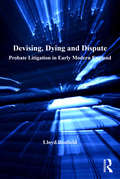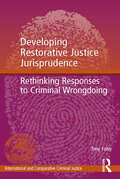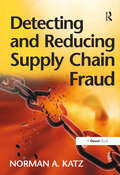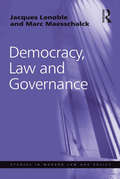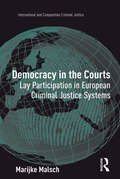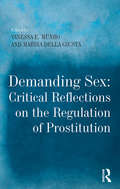- Table View
- List View
Environmental Taxation Law: Policy, Contexts and Practice
by John Snape Jeremy de SouzaThe theoretical arguments for environmental taxes and other types of economic instruments for environmental protection have been discussed extensively in the literature. Rather less well discussed has been the extremely complex form that such instruments have in fact taken in practice. Environmental Taxation Law: Policy, Contexts and Practice examines the legal implications of introducing environmental taxes and other economic instruments into the regulatory framework of UK law. In doing so, it analyzes and explains the difficulties of grafting environmental taxes onto the complexities of existing regulatory structures, not all of which, of course, were originally devised with environmental considerations in mind. Although the focus of the book is the UK's pioneering implementation of a web of distinct yet interrelated policy measures, it locates the UK's taxes and instruments not simply in their broader context of market and environmental regulation, but also in the contexts of European and international law.
Environmental Protection of International Watercourses under International Law
by Owen McIntyreMcIntyre's work explains the legal means by which requirements of environmental protection influence the determination of a reasonable and equitable regime for allocating rights to riparian states to utilize shared freshwater resources. The work examines the means and processes by which environmental considerations can act upon the operation of the principle of equitable utilization. The volume provides a comprehensive analysis of the subject, outlining the development, scope and operation in general and customary international law of key rules of environmental protection.
Environmental Crime in Transnational Context: Global Issues in Green Enforcement and Criminology (Green Criminology)
by Toine Spapens Rob White Wim HuismanEnvironmental crime is one of the most profitable and fastest growing areas of international criminal activity. The increasing cross-border scope of environmental crimes and harms is one of the reasons why governments and the enforcement community have trouble in finding the proper responses. Law enforcement cooperation between western industrialized states is often time consuming and problematic, and the problems increase exponentially when environmental criminals take advantage of situations where government and law enforcement are weak. This book provides an overview of the developments and problems in the field of transnational environmental crimes and harms, addressing these issues from perspectives such as enforcement, deterrence, compliance and emission trading schemes. Divided into four parts, the authors consider global issues in green criminology, responses to transnational environmental crimes and harms, alternative methods to combat environmental crime, and specific types of crimes and criminological research. Discussing these topics from the view of green criminology, sociology and governance, this book will be of great interest to all those concerned about the transnational dimensions of crime and the environment.
Environmental Crime and Social Conflict: Contemporary and Emerging Issues (Green Criminology)
by Avi Brisman Nigel South Rob WhiteThis impressive collection of original essays explores the relationship between social conflict and the environment - a topic that has received little attention within criminology. The chapters provide a systematic and comprehensive introduction and overview of conflict situations stemming from human exploitation of environments, as well as the impact of social conflicts on the wellbeing and health of specific species and ecosystems. Largely informed by green criminology perspectives, the chapters in the book are intended to stimulate new understandings of the relationships between humans and nature through critical evaluation of environmental destruction and degradation associated with social conflicts occurring around the world. With a goal of creating a typology of environment-social conflict relationships useful for green criminological research, this study is essential reading for scholars and academics in criminology, as well as those interested in crime, law and justice.
Environmental Crime and its Victims: Perspectives within Green Criminology (Green Criminology)
by Toine Spapens Rob White Marieke KluinEnvironmental crime is one of the most profitable and fastest growing areas of international criminal activity. These types of crime, however, do not always produce an immediate consequence, and the harm may be diffused. As such, the complexity of victimization - in terms of time, space, impact, and who or what is victimized - is one of the reasons why governments and the enforcement community have trouble in finding suitable and effective responses. This book provides a diverse and provocative array of arguments, critiques and recommendations from leading researchers and scholars in the field of green criminology. The chapters are divided into three main sections: the first part deals with specific characteristics of some of the major types of environmental crime and its perpetrators; the second focuses explicitly on the problem of victimization in cases of environmental crime; and the third addresses the question of how to tackle this problem. Discussing these topics from the point of view of green criminological theory, sociology, law enforcement, community wellbeing, environmental activism and victimology, this book will be of great interest to all those concerned about crime and the environment.
Enforcing International Law: From Self-help to Self-contained Regimes
by Math NoortmannUntil recently, the fundamental link between two basic concepts in international law, namely the right to self-help and the obligation to settle disputes by peaceful means, has been neglected in doctrine and practice. The main issue is that international law traditionally recognizes the right of states to safeguard their own rights by resorting to countermeasures as well as the obligation to settle their disputes by accepted and recognized diplomatic and judicial procedures. Both concepts are based on their own merits, which are assumed to be valid in contemporary international law. It is the primary purpose of this study to determine which rules and principles govern the relationship between the two concepts. The book's major findings arise from an analysis of scholarly work, supported by examples from five different case studies. Drawing insights from legal as well as political science, it will be a valuable resource for students, academics and policy makers in international law, international relations and related areas.
Enforcing Intellectual Property Rights: A Concise Guide for Businesses, Innovative and Creative Individuals
by Jane LambertWhat do you do if ... you need to seek a court order against a former employee who has set up in competition with you, having first helped themselves to your customer database? ... Or if you are deluged with complainants who have bought products they thought were yours, but turn out to have been made from inferior materials and without your knowledge or consent? ... Or if you receive a solicitor's letter complaining that a product you are about to launch infringes their client's trade mark or registered design? Jane Lambert's concise and practical guide gives you the knowledge that you need to make crucial decisions to protect your intellectual assets before it is too late. It should be kept close at hand for use in emergencies, just like a first aid manual. Its purpose is to alert you to problems so that you can take the right steps to manage them, in consultation with your professional advisors, before they develop into crises. And, if the worst does happen and you need to go to law, the guide provides you with the information you need to understand the process, the risks and how to prepare effectively. If you are planning an enforcement strategy, looking for the optimum patent or registered trade mark or design protection and to secure the appropriate insurance to make sure you have a fund available to enforce these, then this book is for you. If you're already in hot water, someone with an intellectual property problem who needs to make fast decisions in very little time, then this book is for you too. It could help you avoid the most expensive mistake of your life.
Electronic Commerce and International Private Law: A Study of Electronic Consumer Contracts (Markets And The Law Ser.)
by Lorna E. GilliesElectronic Commerce and International Private Law examines the maximization of consumer protection via the consumer's jurisdiction and law. It discusses the proposition that a new connecting factor be used to improve the efficiency of juridical protection for consumers who contract with foreign sellers by electronic means and offers recommendations as to how to amend existing jurisdiction and choice of law rules to provide a basis for the consumer to sue in his own jurisdiction and for the law of the consumer's domicile to apply. The book will be a valuable resource for academics, students and practitioners working in the areas of international private law, electronic commerce law and consumer law.
Electoral College Reform: Challenges and Possibilities (Election Law, Politics, And Theory Ser.)
by Gary BughThe United States has not updated the Electoral College system since the Twelfth Amendment was ratified in 1804, despite public opinion polls showing a majority of Americans are in favor of changing or outright abolishing it. So why hasn't the United States reformed this system? Electoral College Reform brings together new essays examining all aspects of this crucial debate, including the reasons for reform, the issues surrounding a constitutional amendment, the effect of the Electoral College on political campaigns and the possibilities for extra-constitutional avenues to change. The authors consider both the Federalists' vision of balanced representation and a more democratic and equality-based ideal. These competing frameworks, perhaps more than any other factor, account for centuries of American indecision on this key issue. By offering an unprecedented and carefully researched analysis of an always controversial subject, this volume explores the potential for changing a system that many contend is long overdue.
Election Law and Democratic Theory (Election Law, Politics, And Theory Ser.)
by David SchultzWhile numerous books and articles examine various aspects either of democratic theory or of specific topics in election law, there is no comprehensive book that provides a detailed and scholarly discussion of the political and democratic theory underpinnings of election law. Election Law and Democratic Theory fills this important gap, as author David Schultz offers a scholarly analysis of the political principles and democratic values underlying election law and the regulation of political campaigns and participants in the United States. The book provides the first full-length examination of the political theories that form the basis for many of the current debates in election law that structure both Supreme Court and scholarly considerations of topics ranging from campaign finance reform, voting rights, reapportionment, and ballot access to the rights of political parties, the media, and other players in the system. It challenges much of the current debate in election law and argues for more discussion and development of a democratic political theory to support and guide election law jurisprudence.
Economic and Social Rights and the Maintenance of International Peace and Security
by Claire BreenThis text comprises cutting-edge research on one of the greatest global challenges: the failure to address systematic economic and social exclusion, and attendant violations of economic and social rights (ESR), as a driver of conflict. The text explores what the UN's obligation to maintain international peace and security can mean when it is informed by the requirement to protect and promote ESR, rights that play a crucial role in maintaining international peace and security but which are often overlooked. The book considers the extent to which Security Council mandated peace operations have been informed by human rights and efforts to promote economic and social development. The approach is to analyse the extent to which the Security Council has interacted with the General Assembly, the Economic and Social Council as well as other Charter-based mechanisms such as the Human Rights Council, and its predecessor, with particular reference to the role of the Special Procedure Mechanisms. The role of the UN High Commissioner for Human Rights is also considered. In this way, the text shows that the connection between peace and security and human rights is well recognised by these organs. In addition, the text considers States’ ESR obligations stemming from the extraterritorial application of such rights in the context of peace operations. Given that States’ obligations stemming from ESR have often been neglected, the book examines how such provision could be improved using ESR-grounded plans reflecting the rights to health, food, water, education, work and life. The text concludes with a call to reimagine what international peace and security can look like when it is informed by the need to recognise the emergence of post-conflict legal obligations based on broader concepts of international peace and security that draw from ESR. This text will appeal to legal scholars, policy advisors, members of the military, those working in the area of development, NGOs and final-year undergraduate and/or postgraduate students working in the areas of international law, political science and international relations, and associated fields of research.
Eco-global Crimes: Contemporary Problems and Future Challenges (Green Criminology)
by Ragnhild SollundBuilding on knowledge within the fields of green and eco-global criminology, this book uses empirical and theoretical arguments to discuss the multi-dimensional character of eco-global crime. It provides an overview of eco-global crimes and discusses them from a justice perspective. The persistence of animal abuse and speciesism are also examined together with policies aimed at controlling the natural world and plant species. Pollution by large corporations, rights of indigenous peoples and the damage caused by the mineral extraction are also considered. Providing new ideas and insights which will be relevant on a global scale, this book is an interesting and useful study of the exploitation of nature and other species. It will be invaluable for students and scholars globally, working within or connected to the field of green and eco-global criminology. The book will also be important for the participants of various social movements, especially the environmental and animal advocacy movements.
Drafting Legislation: A Modern Approach
by Helen Xanthaki Constantin StefanouDrafting Legislation sets out to prove Sir William Dale's doctrine that the rules for drafting good quality legislation are the same in common and civil systems of law. Legislative solutions can therefore serve the drafter, the judge and the practitioner of any jurisdiction. The book discusses the general issue of quality in legislation from the legislative process to the actual drafting interpretation and enforcement. It also analyzes topics related to quality in legislation such as clarity, precision and disambiguity, plain language and gender-neutral language and assesses whether Sir William's view of universality in the definition and elements of quality in legislation is right or not. The volume is of critical interest to students and scholars of European law and the philosophy and theory of law.
Domestic Deployment of the Armed Forces: Military Powers, Law and Human Rights (International And Comparative Criminal Justice Ser.)
by Scott Mann Michael HeadUntil recently, internal use of the armed forces has been generally regarded by the public, as well as academic commentators, as conduct to be expected of a military or autocratic regime, not a democratic government. There is however growing concern that the 'war on terror' has been used to condition public opinion to accept the internal deployment of the armed forces, including for broader industrial and political purposes. This book examines the national and international law, human rights and civil liberties issues involved in governments calling out troops to deal with civil unrest or terrorism. As the introduction of military call-out legislation has become an emerging global trend in the opening years of the 21st century, there is considerable and growing interest in the constitutional and related problems surrounding the deployment of military forces for domestic purposes. Examining the changes underway in six comparable countries, the United States, Canada, Britain, Germany, Japan and Australia, this book provides a review and analysis of this trend, including its implications for legal and political rights.
Diversity and Tolerance in Socio-Legal Contexts: Explorations in the Semiotics of Law
by Vijay K. BhatiaWhy is there so much resistance to recent issues of tolerance and diversity? Despite efforts of the international community to encourage open-mindedness, recent attempts at international, political and economic integration have shown that religious, cultural and ethnic tolerance and diversity remain under threat. The contributions in the volume reflect the growing importance of these issues and why resistance is so widespread. Part I addresses the relationship between the language of law and its power, whilst Part II explores the interplay of tolerance and diversity under visual, legislative and interpretative perspectives. This collection as a whole offers a combination of varied perspectives on the analysis, application and exploitation of laws and will be a valuable source of information for those interested in the general area of language and the law.
Distributive and Procedural Justice: Research and Social Applications
by Kjell Törnblom Riël VermuntThis interdisciplinary and cross-national volume brings together theory and research by prominent scholars within the areas of distributive and procedural justice, not only featuring work within each area separately, as is commonly done, but also showing how combinations of the two justice orientations might operate to affect justice judgments and guide behaviour. Chapters cover various levels of analysis, from intra-personal to interpersonal to group and societal levels. The volume is divided into four sections: distributive justice, procedural justice, distributive and procedural justice, and methodological issues. Each section is subdivided into two parts, basic research and applied research re: current and important societal issues. Each chapter contains an overview of theoretical and empirical research on a particular topic. The volume is designed for use on courses in social psychology, psychology, sociology, political philosophy, and law.
Discourse and Practice in International Commercial Arbitration: Issues, Challenges and Prospects (Law, Language and Communication)
by Christopher N. CandlinIt is increasingly held that international commercial arbitration is becoming colonized by litigation. This book addresses, in a range of ways and from various locations and sites, those aspects of arbitration practice that are considered crucial for its integrity as an institution and its independence as a professional practice. The chapters offer multiple perspectives on the major issues in play, highlighting challenges facing the institution of arbitration, and identifying opportunities available for its development as an institution. The evidence of arbitration practice presented is set against the background of practitioner perceptions and experience from more than 20 countries. The volume will serve as a useful resource for all scholars and practitioners interested in the institution of arbitration and its professional practices.
Disabled Justice?: Access to Justice and the UN Convention on the Rights of Persons with Disabilities
by Eilionóir FlynnDisability offers a new lens through which to view the effectiveness of access to justice, and the inclusiveness of the justice system as a whole. This book analyses the experience of people with disabilities through the entire justice system, from making a complaint, to investigation, and through the court/tribunal process. It also considers the participation of people with disabilities in a variety of roles in the justice system - as witness, defendant, complainant, plaintiff, lawyer, judge and juror. More broadly, it also critically examines the subtle barriers of access to justice which might exist in a given society - including barriers to grassroots disability advocacy, legal education and training, the right to vote and the right to stand for election which may apply to people with disabilities. The book is international and comparative in scope with a focus primarily on examples of legal practice and justice systems in common law countries. The work will be of interest to scholars working in the areas of human rights, equality and non-discrimination, disability rights activists and legal professionals who work with people with disabilities to achieve access to justice.
Dirty Assets: Emerging Issues in the Regulation of Criminal and Terrorist Assets (Law, Justice And Power Ser.)
by Colin King Clive WalkerAdopting a multi-disciplinary and comparative approach, this book focuses on the emerging and innovative aspects of attempts to target the accumulated assets of those engaged in criminal and terrorist activity, organized crime and corruption. It examines the ’follow-the-money’ approach and explores the nature of criminal, civil and regulatory responses used to attack the financial assets of those engaged in financial crime in order to deter and disrupt future criminal activity as well as terrorism networks. With contributions from leading international academics and practitioners in the fields of law, economics, financial management, criminology, sociology and political science, the book explores law and practice in countries with significant problems and experiences, revealing new insights into these dilemmas. It also discusses the impact of the ’follow-the-money’ approach on human rights while also assessing effectiveness. The book will appeal to academics and researchers of financial crime, organized crime and terrorism as well as practitioners in the police, prosecution, financial and taxation agencies, policy-makers and lawyers.
Devising, Dying and Dispute: Probate Litigation in Early Modern England
by Lloyd BonfieldSeventeenth-century England was a country obsessed with property rights. For only those who owned property were considered to have a vested interest in the maintenance of law, order and social harmony. As such, establishing the ownership of 'things' was a constant concern for all people, and nowhere is this more evident than in the cases of disputed wills. Based on a wealth of surviving evidence from the Prerogative Court of Canterbury, the probate jurisdiction which probated wills of the more wealthy English property owners as well as some of those with a more modest quantity of property, this book investigates what litigation over the validity of wills reveals about the interplay between society and law. The volume investigates, catalogs, and systematizes the legal issues that were raised in will disputes in the Canterbury Court in the last half of the seventeenth century. However, this is not just a book about law and legal practice. The records from which it draws plunge us into deeply personal and often tragic situations, revealing how the last requests of the dead and dying were often ignored or misinterpreted by family, friends and creditors for their own benefit. By focusing on property law as reflected in cases of disputed wills, the book provides a glimpse at a much fuller spectrum of society than is often the case. Even people of relatively modest means were concerned to pass on their possessions, and their cases provide a snapshot of the type of objects owned and social relationships revealed by patterns of bequests. This too is true for women, who despite being denied full participation in many areas of civic life, are frequently encountered as key players in court cases over disputed wills. What emerges from this study is a picture of a society for which notions of law and private property were increasingly intertwined, yet in which courts were less concerned with formality than with ensuring that the intentions of will-makers were properly carried out.
Developing Restorative Justice Jurisprudence: Rethinking Responses to Criminal Wrongdoing (International and Comparative Criminal Justice)
by Tony FoleyWhat are the requirements for a just response to criminal wrongdoing? Drawing on comparative and empirical analysis of existing models of global practice, this book offers an approach aimed at restricting the current limitations of criminal justice process and addressing the current deficiencies. Putting restoration squarely alongside other aims of justice responses, the author argues that only when restorative questions are taken into account can institutional responses be truly said to be just. Using the three primary jurisdictions of Australia, New Zealand and Canada, the book presents the leading examples of restorative justice practices incorporated in mainstream criminal justice systems from around the world. In conclusion, the work provides a fresh insight into how today’s criminal law might develop in order to bring restoration directly into the mix for tomorrow. This book will be of interest to undergraduates, postgraduate researchers and lecturers, as well as lawyers who work in the field of criminal law, criminologists, social scientists and philosophers interested in ideas of wrongdoing and criminal justice responses to criminal offending.
Detecting and Reducing Supply Chain Fraud
by Norman A. KatzFor most large organizations, the supply chain is a commercial advantage, enabling innovation, cost management and resilience. But the supply chain is open to fraud: the length and complexity of it creates opportunities for fraudsters to exploit phantom inventory, invent non-existent customers or suppliers, substitute one product for another, cheat on the quality...this list goes on. These frauds present a significant source of additional cost to the organization and expose it to a host of secondary risks: contract, compliance and reputation. Detecting and Reducing Supply Chain Fraud is a pragmatic guide to identifying and managing sources of risk. Norman A. Katz explains the main categories of fraud risk: what they are, what is their significance and how they are exploited by the fraudster. He also explores both the tactical and strategic approaches that you should adopt to help detect and reduce fraud, including detection techniques and the use of technology. He provides tactics for increasing your organization's resilience: increased transparency, appropriate governance, and engaging employees, customers and suppliers in more ethical work practices. If you are responsible for your organization's supply chain, or perhaps involved in audit, compliance or risk management, start using Detecting and Reducing Supply Chain Fraud and look more closely at every aspect of your supply chain, both internal and external. The savings made in fraud reduction, the increased resilience you will give all of your operations and the improved reputation that your business will enjoy, as a contract partner or amongst stakeholders, will repay your investment a hundred-fold.
Democracy, Law and Governance (Studies In Modern Law And Policy Ser.)
by Marc Maesschalck Jacques LenobleDemocracy, Law and Governance details the transformation of the modes of governance of contemporary developed democracies and aims to define the conditions required for promoting public interest in their public policy. Firstly, the volume illustrates why a sound theoretical approach to the concept of law results in opening up the theory of law to the debate on governance in the social sciences. Secondly, it reconstructs the underpinnings of recent debate on governance, focusing on the pragmatist turn that has marked efforts to overcome the inadequacies of both the economic and the deliberative approaches. In fulfilling this second goal, it examines the advances yielded by the pragmatist turn as well as its limitations, and concludes by proposing a theoretical approach for dealing with them. This illuminating book applies recent research in both theory of law and theory of governance to deepen the analytic impact of the recent pragmatist revival.
Democracy in the Courts: Lay Participation in European Criminal Justice Systems (Hakluyt Society, First Ser.)
by Marijke MalschDemocracy in the Courts examines lay participation in the administration of justice and how it reflects certain democratic principles. An international comparative perspective is taken for exploring how lay people are involved in the trial of criminal cases in European countries and how this impacts on their perspectives of the national legal systems. Comparisons between countries are made regarding how and to what extent lay participation takes place and the relation between lay participation and the legal system's legitimacy is analyzed. Presenting the results of interviews with both professional judges and lay participants in a number of European countries regarding their views on the involvement of lay people in the legal system, this book explores the ways in which judges and lay people interact while trying cases, examining the characteristics of both professional and lay judging of cases. Providing an important analysis of practice, this book will be of interest to academics, legal scholars and practitioners alike.
Demanding Sex: Critical Reflections On The Regulation Of Prostitution
by Marina Della GiustaInterrogating supply/demand from an inter- and multi-disciplinary perspective, this collection broadens engagement beyond the routine analysis of the locus of violence in prostitution and the validity of the prostitute's consent. A focus on the supply/demand dynamic brings into play a range of other societal, economic and psychological factors such as the social construction of sexuality, the viability of alternative choices for prostitutes and clients, and the impact of regulatory regimes on the provision of sexual services. The factors which underlie each component of the supply/demand dyad are also studied and an examination is made of their dynamic interrelation. The collection emphasizes the importance of rendering policy makers alert to the evidence emerging from empirical studies conducted in different fields of enquiry, in the hope of moving beyond polarity and politics at the local, national and international level.
